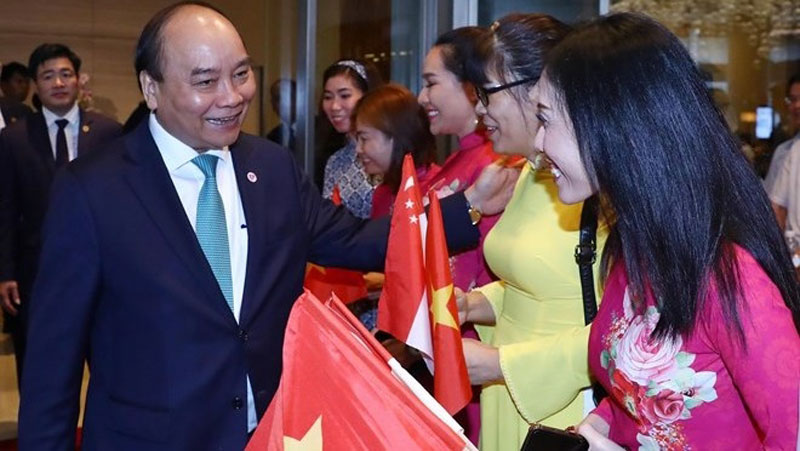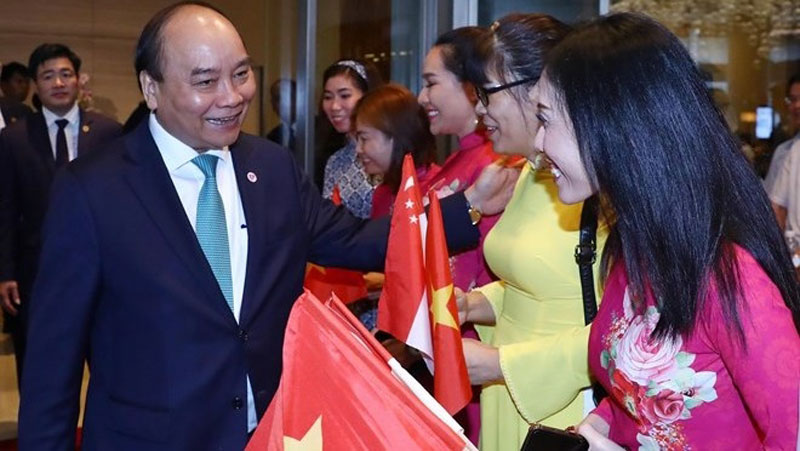


The 33rd ASEAN Summit and related meetings, held from November 13 to 15, were the bloc’s most important events of the year, attracting leaders of the 10 ASEAN countries, along with those of China, Japan, the Republic of Korea, the US, Russia, India, Australia, Canada (G7 Chair), Chile (G20 Chair) and the International Monetary Fund (IMF).
During the trip, PM Phuc engaged in a wide range of bilateral and multilateral activities. He attended and addressed 18 meetings and sessions and also had meetings and working sessions with US Vice President Mike Pence, Chilean President Sebastian Pinera, the Republic of Korea’s President Moon Jae-in, Australian PM Scott Morrison, Malaysian PM Mahathir Mohamad, and Bruneian Sultan Hassanal Bolkiah.
On the sidelines of these events, the Vietnamese PM met with Russian President Vladimir Putin, Japanese PM Shinzo Abe, Canadian PM Justin Trudeau, Thai PM Prayut Chan-o-cha, Lao PM Thongloun Sisoulith, and Cambodian PM Hun Sen to discuss measures for promoting bilateral ties. He also received executives of Sembcorp Industries – one of the leading foreign investors in Vietnam with nine Vietnam-Singapore industrial parks (VSIPs).
On this occasion, PM Phuc and Singapore’s former PM and Emeritus Senior Minister Goh Chok Tong cut the ribbon to open a Vietnamese goods week – a special event to promote Vietnamese products in Singapore.
Within the framework of the summits, PM Phuc delivered important speeches, giving various opinions and contributing to many documents and agreements issued at the events.
He and other leaders adopted 20 main documents and 30 thematic ones on different fields, including a joint statement on the negotiation on the Regional Comprehensive Economic Partnership (RCEP), a statement on the 45th anniversary of ASEAN-Japan friendship and cooperation, the ASEAN-China Strategic Partnership Vision 2030, a joint statement on ASEAN-Russia strategic partnership, an ASEAN+3 leaders’ statement on cooperation in antimicrobial resistance prevention, and a statement on marine plastic waste fight.

Staff of the Vietnamese Embassy in Singapore see off Prime Minister Nguyen Xuan Phuc
Addressing the summits, PM Phuc stressed that based on what has been obtained in 2018, ASEAN’s resilience and innovation must continue to be promoted in the coming years. ASEAN’s unity must remain the key factor in both thought and actions for the sake of a steady, resilient and strongly cohesive ASEAN Community amid the changing global and regional situation.
The Vietnamese Government leader urged ASEAN members to step up cooperation and trust-building dialogue, uphold international law, support a rule-based multilateral international system, and enhance cooperation in innovation areas to optimize opportunities in the Fourth Industrial Revolution.
Voicing concern about current challenges to international economic development, he said sectional interests – the root of protectionism, along with trade conflicts, are posing major challenges, and if they are prolonged, the world and the region will suffer from unpredictable consequences. He called for the continuation of measures to facilitate trade and investment while minimising risks from trade protectionism.
PM Phuc also said that now is the time to make efforts to finalise the RCEP negotiations. Vietnam is willing to join other countries in seeking creative and flexible solutions to achieve the common goals and build the RCEP into a comprehensive, high-quality and interest-balanced free trade agreement that takes into account the development gap among its members.
He called on ASEAN to take the lead in supporting free trade and regional connectivity.
During discussions, PM Phuc reiterated Vietnam’s viewpoint and stance on regional and international issues of shared concern, stressing that a sustainably stable and peaceful environment is the prerequisite for development cooperation, and working for this goal is the common responsibility of all countries.
In terms of the East Sea issue, he and many country’s leaders shared the view that complex developments in the waters have worried all relevant sides and could adversely affect regional stability.
The Vietnamese leader underlined ASEAN’s agreed principles, including respect for international law and the 1982 UN Convention on the Law of the Sea (UNCLOS) in peacefully resolving disputes, self-restraint, no use of threats to use force, no militarisation or other acts that can complicate the situation, trust enhancement, active building of an effective and substantive code of conduct (COC) in the East Sea, and serious and full implementation of the Declaration on the Conduct of Parties in the East Sea (DOC).
Most of ASEAN’s partners pledged to join in efforts to create a favourable environment for dialogue, cooperation and trust building so as to turn the East Sea into waters of peace, cooperation and development.